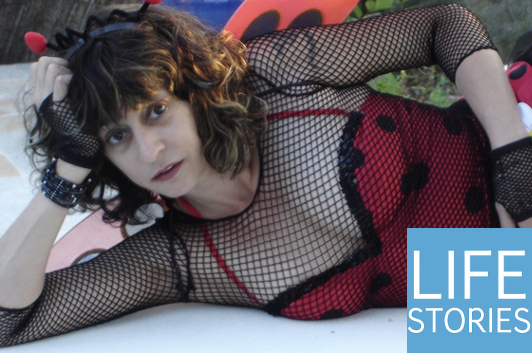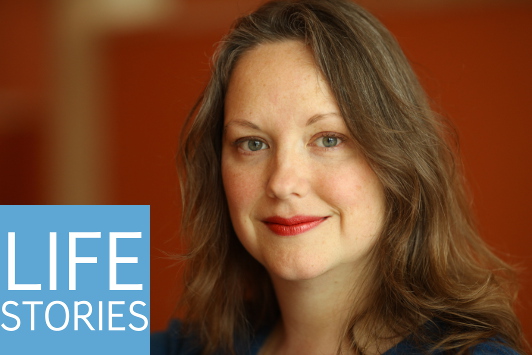Life Stories #85: Kim Addonizio
I didn’t realize until well into my conversation with Kim Addonizio that she’d written (but never published) a full-length memoir, a straightforward narrative about the breakup of a longterm relationship, before Bukowski in a Sundress, the collection of autobiographical essays that we’d met to discuss. That got us to talking about rejection and failure, which dovetailed nicely into some of the larger themes we’d been pursuing about finding the right voice for each of these essays—some of which deal with personal relationships, some of which tackle the writing process, some of which play directly with her reputation as a “confessional” poet—and about claiming her space as a woman dealing with all the things women have to deal with in literary culture. The “Bukowski in a Sundress” tag, for example, had been pinned on her condescendingly by a male critic, and she came to embrace it ironically… then we got to talking about other writers who’d been a much stronger influence on her:
“When I was just starting out as a poet, Sharon Olds was very important to me, because she said things in poems that I didn’t know you could say, and that opened up a lot for me in terms of realizing you could actually talk about things that I thought weren’t supposed to be in serious poetry. And in prose, people like Kathy Acker, for example—at one point, I was reading a lot of [Henry] Miller and Jean Genet and Kathy Acker and Georges Bataille… and Susan Sontag’s essay ‘The Pornographic Imagination,’ and thinking about all those things as modes of writing, expanding the possibilities of what could be said and understanding that writing is about being human, so nothing about being human should be off limits to us as writers.
And for some reason, for some people that seemed to be a new idea in poetry, which makes no sense to me. We’ve got Catullus, we’ve got all sorts of people throughout history who’ve been doing this, and yet I got called ‘edgy’ a lot of times, and I thought, well, I don’t really understand what’s edgy about it. It’s human experience and so why not talk about anything that we are obsessed with or interested in or thinking about or experiencing? And I guess I’ve just always been drawn to a certain aspect of experience. I’m always sort of going down rather than looking up.
I’m not sure why; I mean I could have some sort of therapeutic, psychological reasons why that’s true, but I’ve just been drawn more to the margins and the stuff that is maybe not as talked about in polite conversation. I mean, if I go to a dinner party and people are sitting there stiffly, my first reaction is I want to fuck this up somehow. I want to make some trouble here. Not out of disrespect, but because it’s just hard for me to tolerate a certain kind of decorum… I guess it just goes back to what your character is.”
Listen to Life Stories #85: Kim Addonizio (MP3 file); or download this file by right-clicking (Mac users, option-click). Or subscribe to Life Stories in iTunes, where you can catch up with earlier episodes and be alerted whenever a new one is released. (And if you are an iTunes subscriber, please consider rating and reviewing the podcast!)
photo: via KimAddonizio.com
22 September 2016 | life stories |
Life Stories #84: Emily Winslow
In the winter of 1992, Emily Winslow was a young theater major getting ready for her next semester when she was followed into her building by a stranger who then forced his way into her apartment and raped her. Over the years, she had kept in touch with the sex crimes unit of the Pittsburgh police, even after she moved to Cambridge, England. Then, in 2013, the DNA evidence finally produces a match. The suspect is arrested, and the path to justice begins. Jane Doe January is Winslow’s account of the months that followed—including her frustration when many of those close to her, unsure of how to address the situation, kept an emotional distance that was, just then, the very last thing she needed.
In our conversation, we talk about that, and about why she maintains that what she did isn’t “brave,” and didn’t bring her “closure.” She also dispels an assumption I had made about the journals she was keeping throughout these events, and how it was only later that she decided to turn them into a memoir. No, she told me, this was the plan all along:
“People talk about writing about traumatic experiences as being therapeutic, because it helps you get it out of you. That is true, but for me, that is step one. For me, what’s therapeutic about it is not just letting it out; it’s letting it out and picking it up and using my skills and using my talent to make something that stands alone from me, apart from the crime, and is something beautiful. I wanted to write a beautiful book. I wanted to write a book that was interesting. So for me the therapeutic aspect wasn’t just letting it out. It was, from the very start, crafting it. Because that’s what I do—I use words. That’s what I do.”
Listen to Life Stories #84: Emily Winslow (MP3 file); or download this file by right-clicking (Mac users, option-click). Or subscribe to Life Stories in iTunes, where you can catch up with earlier episodes and be alerted whenever a new one is released. (And if you are an iTunes subscriber, please consider rating and reviewing the podcast!)
photo: Jonathan Player
13 July 2016 | life stories |



 Our Endless and Proper Work is my new book with Belt Publishing about starting (and sticking to) a productive writing practice.
Our Endless and Proper Work is my new book with Belt Publishing about starting (and sticking to) a productive writing practice. 
